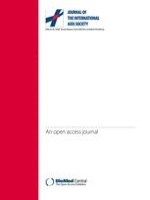Erschienen in:

Open Access
01.11.2010 | Poster presentation
Muscle symptoms and creatine phosphokinase elevations in patients receiving raltegravir in clinical practice: results from a multicenter study
verfasst von:
G Madeddu, V Soddu, E Ricci, T Quirino, B Menzaghi, C Bellacosa, C Grosso, S Melzi, L Valsecchi, M Franzetti, F Vichi, G Penco, A Di Biagbio, G Pellicanò, L Corsico, GVL De Socio, E Mazzotta, G Parruti, M Guastavigna, G Orofino, MS Mura, P Bonfanti
Erschienen in:
Journal of the International AIDS Society
|
Sonderheft 4/2010











